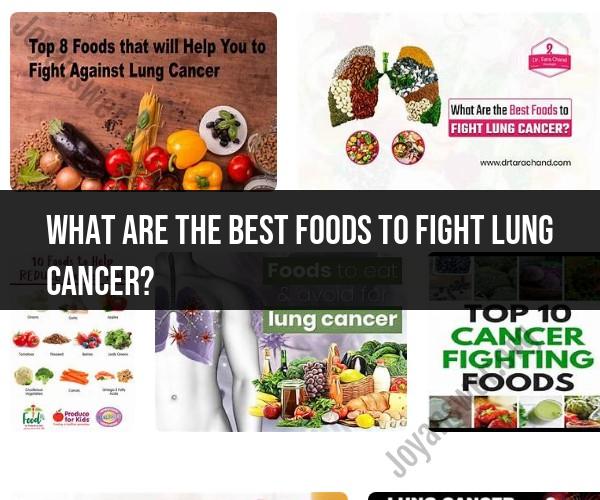What are the best foods to fight lung cancer?
While there is no specific diet that can cure or prevent lung cancer, certain foods and dietary choices may help support overall health and potentially reduce the risk of developing lung cancer or aid in the treatment process. It's important to note that these dietary recommendations should be part of a broader healthy lifestyle and should not replace medical advice or treatment prescribed by healthcare professionals. Here are some foods and dietary tips that may be beneficial:
Fruits and Vegetables: A diet rich in fruits and vegetables provides essential vitamins, minerals, and antioxidants that support the immune system and help combat oxidative stress. Aim for a variety of colorful fruits and vegetables, such as berries, citrus fruits, leafy greens, carrots, and broccoli.
Cruciferous Vegetables: Vegetables like broccoli, cauliflower, cabbage, and Brussels sprouts are high in compounds known as glucosinolates, which may have cancer-fighting properties.
Berries: Berries like blueberries, strawberries, and raspberries are packed with antioxidants and phytochemicals that may help protect against cancer.
Green Tea: Green tea contains catechins, which are antioxidants that may have anti-cancer properties. Drinking green tea in moderation can be a part of a healthy diet.
Whole Grains: Choose whole grains like brown rice, whole wheat, quinoa, and oats over refined grains. They provide more fiber, vitamins, and minerals.
Healthy Fats: Incorporate sources of healthy fats, such as avocados, nuts, seeds, and olive oil, into your diet. These fats can provide essential nutrients and may help reduce inflammation.
Fatty Fish: Fatty fish like salmon, mackerel, and sardines are rich in omega-3 fatty acids, which have anti-inflammatory properties and may be beneficial for overall health.
Lean Protein: Include sources of lean protein in your diet, such as poultry, lean meats, fish, tofu, and legumes.
Limit Processed Foods: Reduce your intake of processed foods, sugary snacks, and sugary beverages. These can contribute to inflammation and may not support overall health.
Stay Hydrated: Drink plenty of water throughout the day to stay hydrated. Proper hydration is essential for overall health.
Moderation: Practice portion control and moderation in your diet. Avoid excessive consumption of red meat, especially processed meats like bacon and sausages.
Limit Alcohol: If you choose to consume alcohol, do so in moderation. Excessive alcohol consumption is associated with an increased risk of various cancers, including lung cancer.
Don't Smoke: The most significant risk factor for lung cancer is smoking. If you smoke, seek support to quit smoking. Avoid exposure to secondhand smoke as well.
Consult a Healthcare Professional: If you have specific dietary concerns related to lung cancer or are undergoing treatment, consult with a registered dietitian or healthcare professional for personalized guidance and recommendations.
Remember that a balanced and varied diet, combined with other healthy lifestyle choices like regular physical activity and not smoking, can contribute to overall health and well-being. Always consult with healthcare professionals for personalized advice and treatment options related to lung cancer.
Fighting Lung Cancer with Nutrition: Best Foods and Practices
Lung cancer is a serious disease, but nutrition can play a role in both preventing and fighting it. Eating a healthy diet can help to strengthen your immune system, reduce inflammation, and even kill cancer cells.
Here are some of the best foods and practices for fighting lung cancer with nutrition:
- Eat plenty of fruits and vegetables. Fruits and vegetables are packed with antioxidants, which can help to protect your cells from damage. Aim to eat at least five servings of fruits and vegetables per day.
- Choose whole grains over refined grains. Whole grains are a good source of fiber, which can help to reduce the risk of lung cancer. Refined grains, on the other hand, have been stripped of their fiber and nutrients.
- Choose lean protein sources. Lean protein sources, such as chicken, fish, and beans, are low in saturated fat and calories. They are also a good source of nutrients that are essential for fighting cancer, such as selenium and zinc.
- Limit processed foods. Processed foods are often high in unhealthy fats, sugar, and salt. They may also contain artificial ingredients and preservatives, which can be harmful to your health.
- Maintain a healthy weight. Being overweight or obese increases your risk of developing lung cancer. Aim to maintain a healthy weight by eating a healthy diet and exercising regularly.
Building a Strong Defense: Foods That Help Combat Lung Cancer
Some specific foods that have been shown to help combat lung cancer include:
- Cruciferous vegetables. Cruciferous vegetables, such as broccoli, cauliflower, and Brussels sprouts, contain compounds that can help to prevent and fight cancer.
- Allium vegetables. Allium vegetables, such as garlic, onions, and leeks, contain compounds that have anti-cancer properties.
- Berries. Berries are packed with antioxidants, which can help to protect your cells from damage.
- Fatty fish. Fatty fish, such as salmon, tuna, and mackerel, are a good source of omega-3 fatty acids. Omega-3 fatty acids have anti-inflammatory properties and may help to reduce the growth of cancer cells.
- Green tea. Green tea contains compounds that have anti-cancer properties.
Nutritional Strategies in the Fight Against Lung Cancer
In addition to eating a healthy diet, there are a few other nutritional strategies that you can follow to help fight lung cancer:
- Take a multivitamin. A multivitamin can help to ensure that you are getting all of the nutrients that you need.
- Consider taking supplements. Some supplements, such as vitamin D and selenium, may help to reduce the risk of lung cancer. However, it is important to talk to your doctor before taking any supplements.
- Eat small, frequent meals. Eating small, frequent meals can help to reduce inflammation and improve digestion.
If you have lung cancer, it is important to talk to your doctor about your nutritional needs. They can help you to develop a personalized plan that is right for you.











